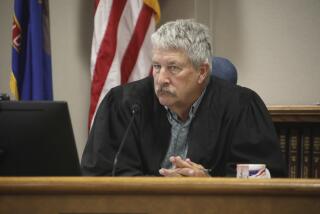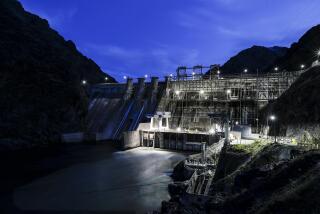In Hard-Luck North Dakota, ‘The Glass Is Always Half Empty’
- Share via
ORRIN, N. D. — When Rand McNally decided last summer not to include North Dakota in a photographic world atlas, Joe Mack and his son, Greg, suspected a conspiracy.
“The question,” Greg Mack said, “is who put pressure on them to leave it out in the first place?”
An absurd idea, some might think--that some shadowy movement would try to obscure whole state--but, from the perspective of the Mack family farm and many others in North Dakota, such fears have a ring of truth.
All across North Dakota, things are disappearing. Greg Mack saw his farm interests vanish into bankruptcy. Joe Mack’s holdings have shrunk to a third of the 5,000 acres he once owned. The village 2 miles down the road has all but withered away, as have many other small towns. Since 1980, about 20,000 people have moved out of the state, many of them to more prosperous Minnesota.
Further decline seems inevitable. North Dakota has more financially vulnerable family farms than any other Plains state because of a 40% decline in land values and prolonged drought. A 22% drop in oil production has shaken another pillar of the economy and is contributing to what Rep. Byron L. Dorgan (D-N.D.) calls “an eight-year recession.”
“There is this sense that the best is over for North Dakota and that the future is going to be inevitably worse,” said David Danbom, an agricultural historian at North Dakota State University. “This is the only state that has fewer people now than it had in 1930. . . . The glass is always half empty.”
As the Macks’ atlas-conspiracy theory might suggest, there is more to the story than economic decline: There is a bitter suspicion that North Dakota’s troubles are stirred up by outsiders. It is a belief embedded in the historical memory of a place that has always produced raw goods and seen the profits go elsewhere.
“All our money goes east,” said Joe Mack, reciting the mantra of the North Dakota farmer.
In the first quarter of the century, the outside enemy was bankers, railroad tycoons, Minneapolis grain traders and other middlemen in the grain business. The populist Nonpartisan League, the signal political movement of North Dakota’s 100-year history, rose up in 1915 to do battle with those forces.
“The problem the farmers had was they felt that they were at the tail end of a long string of events and had no control,” said Sarah Vogel, populist descendant of a League leader who is state agriculture commissioner.
“There is concern that big grain firms like (Minneapolis trader) Cargill have better access to the people who write the rules and regulations than farmers do,” she said.
One of the sorest points on her list of complaints is the U.S.-Canada Free Trade Agreement, which she says stifles exportation of North Dakota grain and invites Canadian grain into the United States. This belief is reinforced daily by the sight of Canadian grain trucks plying the roads near the Macks’ farm.
In short, not too much has changed since the NPL was founded. The “bogey man thing,” as Danbom calls North Dakotans’ distrust of outsiders, continues to haunt North Dakota minds.
On farms such as the Mack family’s, suspicion of outsiders is deeply rooted in the immigrant experience of people who exchanged a harsh life on the steppes of the Ukraine for a harsh life on the American prairie.
Joe Mack’s German-Russian grandfather came from the Odessa region on the Black Sea, a part of the Ukraine that was settled by Germans in the early 19th Century with the encouragement of Czar Alexander I. The Germans established there very insular communities centered around the farm, the village and the church.
The U.S. Homestead Act’s promise of free land lured some of them to America about 100 years later. They flocked to North Dakota, partly because it was not yet settled and they could continue to live here in their clannish way. They took up where they left off in the Ukraine--raising wheat and barley, building houses out of sod and speaking German.
Timothy J. Kloberdanz, an anthropologist at North Dakota State University and co-author of “Plains Folk: North Dakota’s Ethnic History,” said that the German-Russians brought with them a defensive attitude that has helped shape the state’s identity. Most estimates are that their descendants make up about 25% of North Dakota’s population.
“The German-Russians have often felt that because of their geographical isolation, both on the steppes of Russia and the prairies of America, that they are treated as second-class citizens,” he said.
In the last two years, as severe drought took its toll, the elements have exacerbated that feeling.
Here, at this time of year, the sun ventures only so high to draw light out of the vast, glacier-carved plain. Alkali flats dot the landscape--pools of dull gray amid the brown shades of grass and soil. The hills near the Mack house are lightly dusted with snow, and overhead, the last migrating fowl beat slowly southward.
The Macks made a living off this land for three generations, wisely varying crops and raising livestock as a hedge against poor grain harvests. Then the family made some devastating mistakes in the 1970s--largely, says 63-year-old Joe Mack, because they listened to advice.
American farm exports then were rising sharply. Bankers, government officials and land-grant universities encouraged farmers to take on new debt and expand production. Greg Mack, 36, recalls that in the mid-’70s, bankers were eager to lend money to anyone not saddled already with debt.
“These bankers would check the courthouse to see who was free and clear,” he said. “They would come out and say: ‘We’ll lend you some money and make you a bigger operator.’ And the people out here were very trusting.”
The Macks expanded the farm by acquiring nearly 5,000 acres. Then, in the early 1980s, came the crunch. A rise in the value of the dollar and foreign competition severely reduced demand for American products. Farm land values plummeted and the banks began to call in loans.
Greg Mack filed for bankruptcy--and he had plenty of company. Approximately 3% of North Dakota farmers did so in each year of the mid-1980s, one recent study found.
Joe Mack, meanwhile, was on the verge of foreclosure. By his own account he was saved by a woman who was beginning to make a career of battling the outsiders--Sarah Vogel.
Vogel says that as the number of farm foreclosures began to rise in 1982, she remembered her grandfather’s stories of an earlier time. With help from the American Civil Liberties Union and other lawyers, she filed a class-action suit in 1983 against the Farmers Home Administration, the principal federal lender.
Court injunctions were won and farm foreclosures ground to a virtual halt. Later, Congress passed legislation to allow restructuring of farm debts to avoid foreclosure if possible.
On the strength of her reputation as a champion of farmers, Vogel in 1988 ran for agriculture commissioner and was the first woman in U.S. history elected to a top farm post in any state.
As hostile as she is toward the federal government, Vogel, like many other heirs to North Dakota’s populist political legacy, is a firm believer in the good intentions of the state government in Bismarck. Hence her firm support of a referendum to raise state income, sales and gasoline taxes that was put to the voters last Dec. 5.
The tax question crystallized a new, and perhaps ironic, hostility in North Dakota.
“The problem this time isn’t outsiders,” tax opponent Curly Haugland said before the vote. “It’s our own (state) government. . . . We have a government taking advantage of the paranoia of 30 to 40 years ago and feeding on it.”
Haugland and Kent French, a Bismarck mobile home dealer who led the anti-tax forces, said that state officials raised taxes to feather their own nests and then cynically warned that public services would have to be cut back unless the voters approved higher rates.
The voters seemed to agree with French. The tax increases were rejected in an unusually large turnout.
The defeat means that state officials will have to make do without $110 million in revenue. It is a severe problem in a state whose biennial budget actually declined between 1985 and 1987, and this year was expanded only slightly on the assumption of higher taxes.
The only good fiscal news has come in the form of federal farm aid. In 1988, when farmers lost more than $600 million on crops because of the drought, the U.S. government parceled out more than $400 million in disaster aid--the most paid in any state.
To Joe Mack, the particulars of state finances are of no import. He thinks that, one way or another, he and his remaining 1,500 acres are going to come out on the short end.
If income, sales and gasoline taxes do not go up, he thinks property tax rates will be boosted instead. State officials generally concur.
“You’re damned if you do,” said Mack, with a perverse glimmer in his eye, “and damned if you don’t.”
More to Read
Sign up for Essential California
The most important California stories and recommendations in your inbox every morning.
You may occasionally receive promotional content from the Los Angeles Times.













